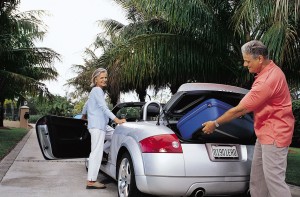The 2010 Del Webb Baby Boomer Survey was just released, and the nation’s largest builder of active adult (55+ age-qualified) communities concludes that Boomers are ready and willing to move upon retirement.
“According to the Del Webb survey, nearly a third of older Baby Boomers plan to move in retirement, with more than 50 percent planning to move to a different state, about 25 percent of them planning to move to a different city within the same state, and less than 20 percent of older Boomers planning to move within the same city.”
So, are we going to see a great movement of Boomers criss-crossing the country in the coming years? The definite answer is: It depends.
What I find fascinating is that the results are different from the MetLife Mature Market Institute (MMI) / National Association of Home Builders 55+ Housing study which was completed just last year. It could be that the samples and questions are different, but Del Webb concludes that the Boomers are more mobile than MMI found.
Creating Results has spent more than 15 years of marketing real estate to older, more affluent homebuyers, including a large number of premier active adult communities. What we have found is that – absent the high cost of living states and escape from urban areas – only a small percentage of people are willing to move more than 100 miles.
Most people don’t want to move at all and would prefer to age in place. In 2009, this desire helped turn active adult housing from a sweet spot into a question mark. Boomers and beyond stayed put.
National studies can provide insights into broad trends, but it is generally not helpful (and even potentially dangerous) to apply the findings to individual communities. Motivators vary significantly. It is important to conduct specific research to develop target markets profiles for each community.
We also caution people against making assumptions about grandchildren and children. For many Baby Boomers, this is a critical motivator. However, for others it’s just not that important.
 We wonder what percentage of the respondents to the 2010 Del Webb study were single. In our experience, that is a growing market in which prospects often are not as concerned about proximity to grandchildren. In some of the active adult communities we market, 1/3 of the buyers are single and they complain that a focus on grandchildren makes them feel excluded. They are concerned that they won’t fit into the commuinity.
We wonder what percentage of the respondents to the 2010 Del Webb study were single. In our experience, that is a growing market in which prospects often are not as concerned about proximity to grandchildren. In some of the active adult communities we market, 1/3 of the buyers are single and they complain that a focus on grandchildren makes them feel excluded. They are concerned that they won’t fit into the commuinity.
What do you think of the 2010 Del Webb Study? Share your thoughts below.



